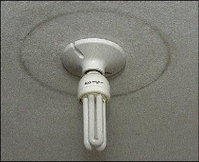A workable energy-savings plan
Published: Sunday | July 26, 2009

Jarrett
I was interested and encouraged to read the account of the Editors' Forum held recently regarding expanding the energy audit throughout the public sector and this is most welcome. However, I would like to suggest that they look very carefully at not only the government buildings and vehicles, but also at the numerous police stations and National Water Commission facilities, particularly the security lighting.
At my home and office we replaced all the 175-watt mercury vapour bulbs in the 15 "dusk to dawn" security lights with the 65 watt energy saving bulbs and we received a twofold reward. First, each lamp immediately had a 63 per cent energy saving which was reflected on the next month's JPS bill, and second, the 65-watt, energy-saving bulb emitted the equivalent light of a 325-watt incandescent, so overall you will get a 63 per cent reduction in energy consumption and an 85 per cent increase in effective lighting. This in turn could, depending on the circumstances, allow the removal of 30 per cent of the lighting fixtures.
The conversion from the 175-watt mercury vapour bulbs to the 65-watt energy-saver bulbs requires some adaptation. However, the cost of the bulb and the hardware conversion, which can be done by any experienced electrician, should not cost more than $3,000 per lamp which, on average, can be recovered in four months based on the energy savings, making it well worth the initial expense. In addition, while a 110-volt lamp may require some hardware changes, 220-volt lamps usually only requires the purchase of a new bulb, which was priced at $1,000 up to the middle of last year.
phenomenal savings
If this modification were done, where possible, to all these types of security lights in the public sector; police stations, fire stations, schools, parish councils, hospitals, post offices, courthouses, pumping stations ... the savings would be phenomenal! Using a rough calculation that each light runs for 10 hours per day, 30 days per month, the 175-watt bulb will burn approximately 52,500 watt-hours or 52.5kWh. On the other hand, the 65-watt energy-saver bulb will burn approximately 19,500 watt-hours or 19.5kWh, with the average cost per kWh being $22.22. These calculations are based on my personal bill last month, and represents a 33kWh per month saving, which comes to $733.26 per lamp per month or $8,799.12 per annum ... and remember, all this is based on an initial one-off investment of $3,000. If we apply this formula to the approximately 189 police stations, counted from the telephone book, across Jamaica not including the area or divisional offices and conservatively estimate that each station has at least three of these security lights this would mean a minimum of $5 million saved per year.
Admittedly, it will be tedious and initially require some capital; however the immense savings to be had by the public sector, by far the largest consumer of electricity makes it more than worth the effort!
Furthermore, and just as importantly we must ensure that we monitor these security lights for malfunction. One often drives by public sector infrastructure only to see these same security lights on during the day which means that the photodiode that controls when the lights turn on and off have become defective and therefore they never actually "turn off", thus the light is "burning" for at least 12 hours extra per day with the meter literally "running", resulting in money that could be used elsewhere being used to pay for an unnecessary expense. Perhaps a way to tackle this waste could be some to put in place some sort of incentive for the public sector, where, for example, the department that manages to reduce its electricity bill on a consistent basis over a specified period is publicly recognised at a well-publicised function. There is nothing like competition to motivate those of us who are only able to participate in the good of all if we see a direct benefit for ourselves ... If we are to curb the waste and inefficiencies in the public sector we need to find a way to let every Jamaican "buy into" energy conservation at every level.

The fluorescent light bulb saves energy. - File
notifying the relevant authority
It is also important for us, the citizens of this nation, who might not be directly involved in a government entity, to notify the relevant authority when they see waste occurring. This could be as simple as spotting a light that is burning during the day or a running or broken water pipe or a malfunctioning street light, to as serious as an issue as "tiefing" of electricity. Remember, every dollar we save is a dollar earned.
Let us all take up our mantle of civic responsibility and help make Jamaica become energy efficient. Think about it ... if we really apply ourselves we can without a doubt save in one year at least 50 per cent of the money Education Minister Andrew Holness needs to build enough schools to get off the shift system and give our children a proper and complete education!
Come on Jamaica, let's do it for our children, our future.
Mark N. Kerr-Jarrett is managing director of Barnett Limited, Montego Bay. Feedback may be sent to columns@gleanerjm.com.
